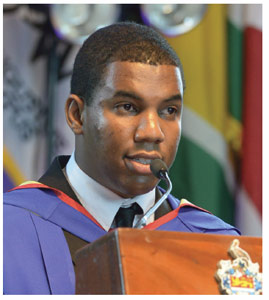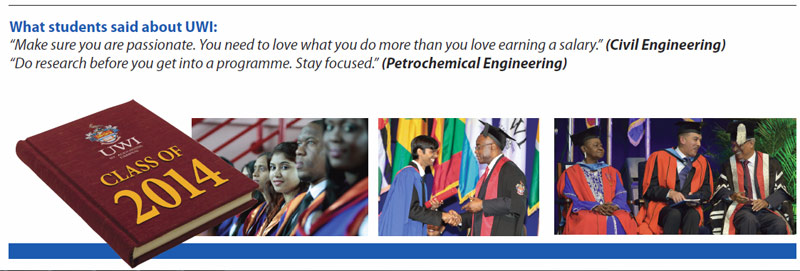|
December 2014

Issue Home >>
|

 
The West Indies is a community full of talented individuals who, because of our focus on achieving a first world status, tend to develop by focusing on political buzzwords: infrastructure, inequality, transparency, security, industry, and so on. We all know them from dozens of stump speeches and government press briefings and therefore they have become our national goals. Admirable, yes but severely limiting. There is a consensus among Trinidadian parents (and probably West Indian parents as well), that the only worthwhile occupations are the lawyer, doctor and engineer; the result of a culture that feeds into the sustainable development goals. Engineers are needed to build the country. Doctors are needed to take care of its citizens. Lawyers are needed to represent the previous two.
The curse of this philosophy is a society that is robbed of the things that make it stand alongside the great civilizations of the world: culture, science and innovation. Culture gives an identity with which to link societies together in a shared humanity. Bob Marley did this as evidenced by his worldwide fan base. Our history, involving the peoples of three continents has allowed the Caribbean to promote its culture worldwide with relative ease. On the contrary, our past has not bred scientific thinking in the same fashion
The speech I am delivering here was inspired by many interactions that I have had with people who all assumed the same future for me based on my penchant for science. People assumed that I was planning to do medicine or engineering, based on having done the sciences at CAPE. And why wouldn’t they? The CAPE syllabus for biology is a pre-medical programme for the most part. We have thousands of students who are good in science who are pressured into medicine, engineering or even law because there appears to be no appreciation for pure science in the Caribbean. Same too for agricultural science, probably even less so. Society sees agriculture as farming, as a pre-independence relic, irrelevant to our modern Caribbean economies.
This speech is also based on my observations of Trinidad and, by extension, the nations of the Caribbean region. A society which, while it scholastically overachieves, is a mere spectator, waiting on others to affect advancement.
I stand here today as an advocate for science. Not just for scientific theories, but for the culture of scientific thinking, the desire for discovery, for the West Indies to be genuinely part of the future that the world is gearing towards and of which we are good enough to partake. There is no reason that a scientific culture cannot exist in the Caribbean. There is no reason that the Caribbean cannot lead the world one day in vertical farming. There is no reason that in a region that is essentially a volcanic archipelago, which receives a healthy amount of sun and wind, we cannot be the ones pioneering alternative forms of energy. There is no reason that CARICOM cannot one day have a space programme or a supercollider of its own. There is no reason, theoretically, that all of this cannot happen one day.
The West Indies is home to some great academics. I met them daily in lectures in my three and a half years here. The very first lecturer I had was Professor Dave Chadee; a man whose work with vector borne diseases is praised among academics. A “Trinidad Guardian” article written by Dr. Raymond Ramcharitar on Monday 6 October of this year, profiled his illustrious career and his work with the Ministry of Health which seems to be slow to implement his suggestions. If I were the Minister, I would be hanging on to every one of the Professor’s words. Our society, which has shaped our governments, however, tends to drag its feet with respect to scientific research.
I currently work with another scholar in the Faculty of Medical Sciences, by the name of Dr. Allana Roach; someone who is conducting research with the aim of the future integration of genetic counselling and testing into the local health system. A few months ago, I spoke to a family friend about the work with which I was assisting Dr. Roach; the response was very cynical, citing the number of logistical problems, which would withhold any progress. Cynicism is a behaviour prevalent among the educated; I know this personally. But why do we do this to ourselves? Why do we anticipate the darkest timeline, when we know that as a people we have the capacity to direct our future in a bold new direction?
So, to all of the students here who wish to pursue a career in the scientific fields, in research or in an innovative new sector to which you seek to pioneer in the West Indies, at times you may feel like you are pushing against a wall. I ask that you be persistent if your innovative proposals go unnoticed. I ask that you be perseverant when your ideas are only appreciated by the academic field to which you belong. I also ask that because nobody seems to care does not give you a reason to stop trying. We need to work at making our field of study truly matter and convincing those in power that there is a reason to invest in science for the purposes of research, discovery and experimentation. Here before me are many graduates who are smarter than I am and definitely have more spine than I do. Your hardest tasks would not involve researching but campaigning on behalf of your work.
To all of the students here who wish to pursue careers in other fields such as medicine, education and engineering, I ask this favour: that you leave here not only as experts in the scientific disciplines but also as ambassadors for the scientific method. Take with you a spirit of innovation and an aptitude for logical deduction. Be not afraid to investigate, always look out for potential hypotheses to test. While these other fields may have failure standards, the only time we fail in science is when there is nothing new to learn. Do not simply be part of crowd, set yourself apart with the education that you have obtained here. Your iconoclasm may not win you friends in the establishment, but science is nothing if not defying conventions.
My father was always interested in the universe and had dreams of becoming an astronomer. However, he knew that was an impractical career in Trinidad and Tobago 35 years ago. How many other young men and women aspire to do something that is deemed irrelevant in the West Indies but are met with the confines of society’s aspirations? How many are free thinkers, experimenters and visionaries but are not needed in a region supposedly determined to achieve first world status. I know these are simply dreams but let us at least make an effort. I do not want the West Indies to sit on the sidelines of scientific development waiting for the rest of the world to make its move. We may be small islands but we do not have to have a small island mentality. We may have given the world reggae, calypso and steelpan, but these are innately tied to West Indian culture. A scientific innovation, however, is an achievement of humanity, something that makes the West Indies important in the grander scheme of things. We can contribute
something substantial to the world, if we are willing to open the minds of the public to the fact that we, West Indians, have the intellectual capital to achieve so much more and contribute in ways that will not only move the region forward but humanity forward as a whole.
Here’s to the flags of our region on Mars one day. It is a dream of course, but even if we advance in that general direction, we would have all done our jobs as Caribbean scientists.

|





